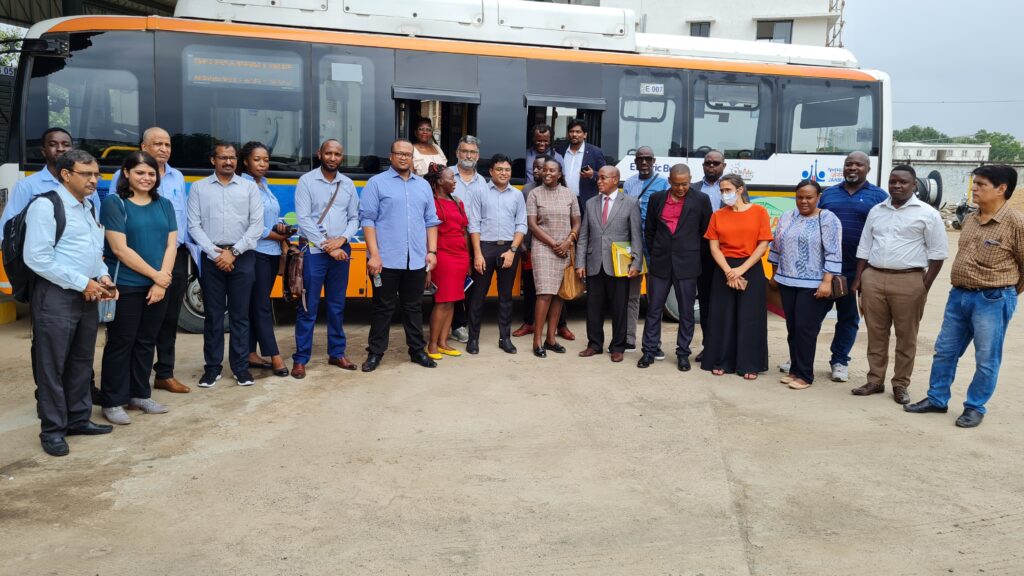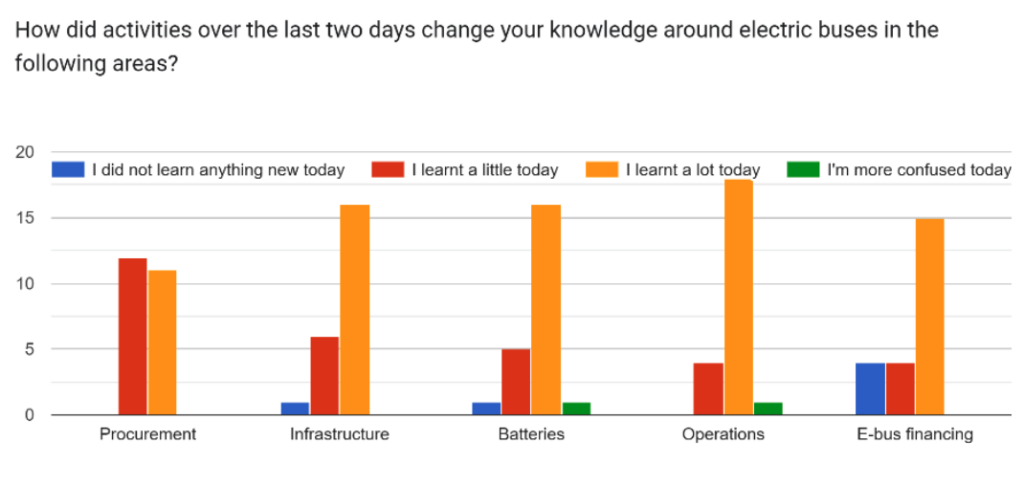
Electric buses are key to decarbonizing cities. Compared to internal combustion engine buses and cars, they improve air quality, reduce greenhouse gas emissions, are cheaper to operate and are more reliable in many cases. But the transition to electric buses — especially in emerging economies — faces many barriers, including limited financing, nascent private industry capacity, unreliable charging infrastructure and a lack of political will and stakeholder knowledge.
Peer-to-peer learning sessions and knowledge exchanges among developing cities are key to overcoming these barriers. Peer learning can facilitate the exchange of practical “how-to” knowledge and offer valuable insights on electric bus adoption in these contexts.
To this end, WRI Africa and WRI India organized the first ever TUMI E-Bus Study Tour. African city delegates discussed various electric transit bus (e-bus) challenges and opportunities with Indian colleagues. They also visited four Indian cities currently adopting e-buses: Mumbai, Ahmedabad, Hyderabad and New Delhi. The tour was 10 days and took place from August 1 to August 10, 2022. The 11 African city officials came from cities with little to no prior e-bus adoption experience: Abidjan, Durban, Kampala, Kisumu and Nairobi.
The purpose of the study tour was to:
- Learn about the progress that Indian cities are making to transition to electric buses, including bus procurement, bus planning and operations and provision of charging infrastructure.
- Offer networking opportunities to Indian and African government offices, including opportunities for African delegates to meet with private sector vehicle manufacturers and Indian civil society organizations.
As part of the study tour, WRI Africa administered a survey to capture lessons learned from the delegates and showcase the value of the exchange. Below are three main takeaways from their experience:
1. Delegates deepened knowledge on E-Buses
During the 10-day tour, the delegation met with key e-bus stakeholders: Brihanmumbai Electric Supply & Transport (BEST) and Brihanmumbai Municipal Corporation (BMC) in Mumbai; Ahmedabad’s Janmarg Limited’s (AJL) Bus Rapid Transit (BRT); the Bus & Car Operators Confederation of India (BOCI) in Hyderabad; and Convergence Energy Services Limited (CESL) and the National Institution of Transforming India (NITI) Aayog in New Delhi.
Survey responses showed that the tour broadened their knowledge on a wide range of topics (See Figure 1). A respondent said, “discussions with the different operating entities, from Mumbai to Delhi, all offered important learnings on the operational aspects of electric buses.” The survey further revealed that the African delegates found lessons from India’s experience such as contracting models, procurement, partnerships with OEMS and charging stations useful for e-bus deployment in their own cities.

2. Delegates reported improved understanding of how industry and government can successfully collaborate
Lack of political will and absence of public-private engagements often hinders e-bus adoption in cities. In India, the Faster Adoption and Manufacturing of Electric Vehicles (FAME) national program supports engagement and alignment between cities and original equipment manufacturers (OEMs). FAME provides financial and non-financial incentives to encourage OEMs to produce e-buses and helps create a competitive market.
One of the main takeaways for delegates was understanding how the government and OEMs work together to deploy e-buses. One respondent said, “[government] incentives have really given the boost to the private sector… Indian government has really invested in not working in silos, but the private operators feel involved in the process.”
Getting insights into successful public-private partnerships is valuable for delegates as African cities begin to electrify their transport sector. Furthermore, the tour was an opportunity for African delegates to make connections with Indian OEMs who are major players in the African e-bus market.
3. Delegates identified potential technical topics that TUMI can assist with in the future
The study tour also helped delegates reflect on technical knowledge gaps in their cities. Respondents identified battery technology, partnerships with global e-bus players, contracting models and working with operators in the informal sector as key areas where assistance would be useful. These topics will help projects such as the TUMI E-Bus Mission to give better technical assistance to African cities for e-bus adoption.
This project update originally appeared on WRI.org
Mende Thuji Yangden is a Project Assistant for Electric Mobility at WRI Ross Center for Sustainable Cities.






